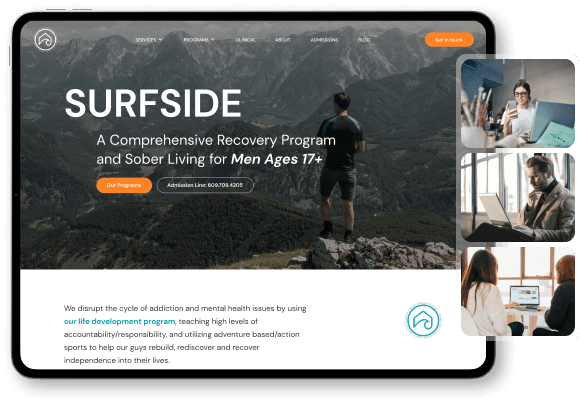blog
Why a Strong Online Presence is Essential for Mental Health Professionals
Nov 11, 2024
In today’s digital age, having a strong online presence is no longer optional for mental health professionals—it’s essential. For therapists, counselors, and mental health facilities, building a digital footprint not only boosts visibility but also enhances credibility and trust with potential clients. With many individuals searching for mental health support online, a robust online presence can be the bridge to connecting with those who need help the most.
In this article, we’ll explore the importance of a strong online presence for mental health professionals, how it impacts client trust and outreach, and key strategies for establishing and growing your digital presence.
1. Expanding Reach in an Increasingly Digital World
With more people turning to the internet for information, having a solid online presence is crucial for mental health professionals. A well-designed website and strong digital presence allow potential clients to find your services easily, especially through online searches for keywords like “therapist near me” or “counseling services.” As individuals increasingly rely on search engines to locate support, a website optimized for mental health services can be the key to expanding your reach and attracting clients who may not find you otherwise.
2. Building Credibility and Trust with Clients
When someone is considering therapy or counseling, trust is paramount. A professional online presence—complete with a user-friendly website, informative content, and client testimonials—can establish credibility and make clients feel more comfortable reaching out. Your website is often the first impression prospective clients have of your practice. High-quality images, intuitive navigation, and clear information about your services, qualifications, and approach can all contribute to a trustworthy and welcoming digital presence.
3. Providing Accessible Information for Better Client Engagement
A strong online presence isn’t just about being found; it’s also about engaging with potential clients effectively. Mental health professionals can use their websites and social media profiles to offer valuable resources, such as blog posts, mental health tips, self-help guides, and frequently asked questions. These resources not only provide helpful information to prospective clients but also showcase your expertise. Sharing mental health information establishes you as a knowledgeable resource and encourages potential clients to trust your services and insights.
4. Streamlining the Appointment Process
An online presence can make the client journey smoother by simplifying appointment scheduling and intake processes. Many mental health professionals now offer online scheduling, telehealth sessions, and secure intake forms on their websites. These conveniences make it easier for clients to take the first step toward care, eliminating barriers and increasing the likelihood that they’ll choose your services. Features like online booking can be integrated into your website and offer clients the flexibility to schedule appointments at their convenience.
5. Enhancing SEO to Improve Search Engine Visibility
Search engine optimization (SEO) is a key component of any online presence. SEO strategies help your website rank higher on search engine results pages (SERPs) when people search for relevant terms, such as “therapist for anxiety” or “online counseling.” By optimizing your website content with targeted keywords and phrases, as well as creating quality content, you increase your visibility on search engines. SEO techniques can also include optimizing meta descriptions, creating location-specific pages, and building backlinks—all of which can drive more traffic to your website.
6. Engaging with Clients on Social Media
Social media platforms, such as Facebook, Instagram, and LinkedIn, offer mental health professionals additional avenues to connect with potential clients and build a strong online presence. Social media allows you to share mental health tips, insights, and updates about your services. Posting regularly on social media not only keeps your audience engaged but also helps foster a sense of community and support. Many clients find it reassuring to see mental health professionals active on social platforms, as it makes them feel more connected and informed about the practice.
7. Leveraging Client Testimonials and Success Stories
For individuals seeking mental health support, hearing from others who have benefited from similar services can be incredibly reassuring. Adding client testimonials and success stories to your website helps potential clients relate and visualize the positive outcomes of working with you. Reviews and testimonials act as social proof, validating the quality and effectiveness of your services. A strong testimonial section can be a powerful tool in building trust and increasing your conversion rate.
8. Maintaining a Professional Brand Online
A strong online presence enables mental health professionals to maintain a professional and cohesive brand that reflects their values and approach to care. A well-designed website and consistent social media presence allow you to communicate your mission, values, and expertise effectively. Whether you specialize in anxiety therapy, couples counseling, or trauma recovery, presenting a clear and consistent brand across digital platforms can attract clients aligned with your approach and philosophy.
9. Reaching Clients Who Prefer Digital Services
With the rise of telehealth, a growing number of clients are seeking therapy options online. Having a professional online presence is essential for promoting and supporting telehealth services, which offer greater accessibility and convenience to clients. By offering secure online sessions and consultations, mental health professionals can meet the needs of clients who may prefer virtual therapy due to location, time constraints, or personal preference. This adaptability shows that you are client-focused and responsive to evolving mental health care trends.
10. Staying Competitive in the Mental Health Industry
As more mental health professionals recognize the value of an online presence, staying competitive in the industry requires investing in digital visibility. A professional online presence not only helps you stand out but also establishes you as a forward-thinking provider committed to accessibility and client engagement. By keeping your website, SEO, and social media up-to-date, you demonstrate an ongoing dedication to connecting with and supporting your clients.
Final Thoughts: The Value of a Strong Online Presence for Mental Health Professionals
For mental health professionals, a strong online presence is essential for building credibility, expanding reach, and creating meaningful connections with clients. By focusing on elements such as a user-friendly website, SEO, social media engagement, and telehealth options, therapists and counselors can improve their digital visibility and impact more lives. Embracing digital strategies in today’s competitive landscape not only enhances client engagement but also fosters a reputation of trust and reliability, making it easier for those in need to take the first step toward mental health support.
In a world where people turn to online resources for nearly everything, investing in a professional and accessible online presence is one of the most effective ways mental health professionals can grow their practice and make a difference.
Do you find this article useful?
We create beautiful websites for mental health businesses that will help families and people in need to make the right choice. Let us help you improving your website, we got the experience and the passion to convert visitors into customers.
Get in touch and let us help you with your website
Prev
Next



